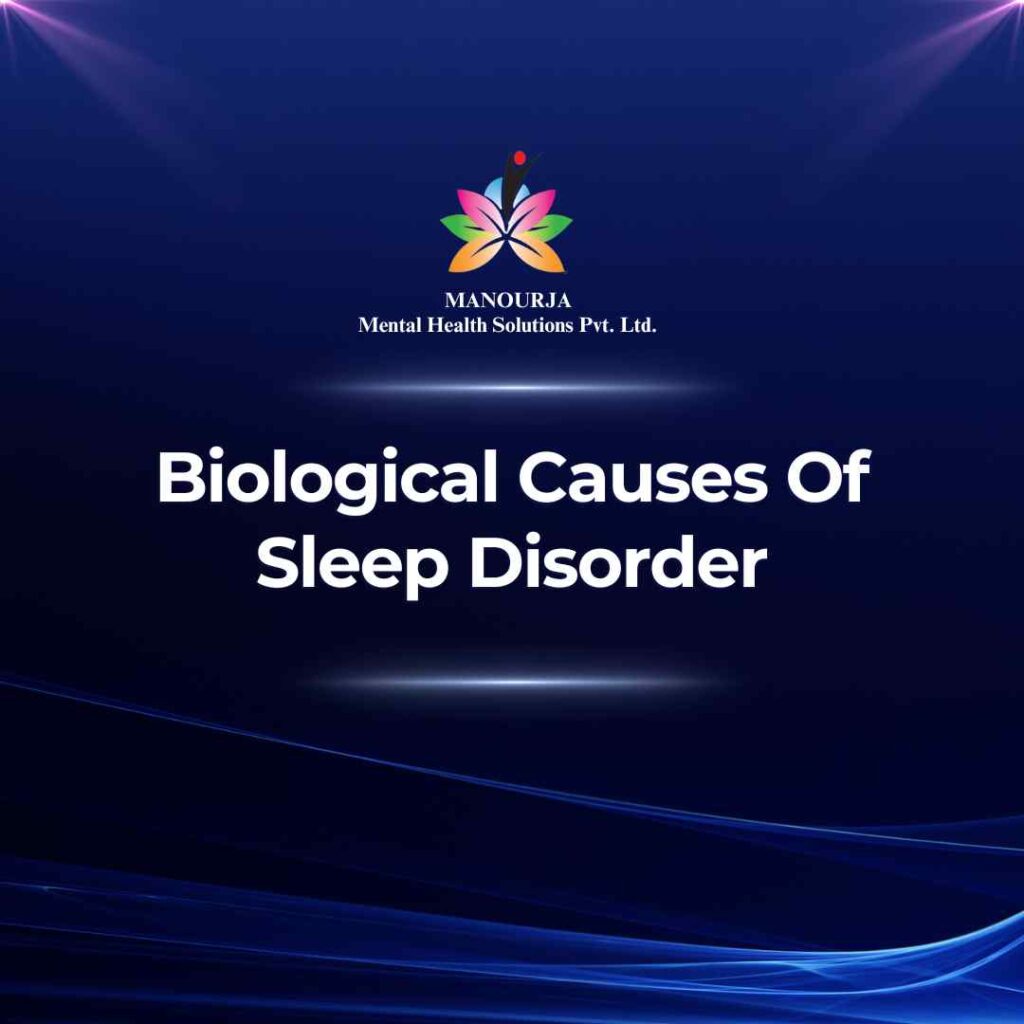Biological Causes of Sleep Disorder

Sleep disorders can be triggered by a range of biological causes, often involving complex interactions between genetic factors, bodily systems, and environmental influences. Here’s an overview of some key biological causes of sleep disorders:
- Genetic Factors: Certain sleep disorders, like narcolepsy, are strongly influenced by genetics. Genetic variations can affect neurotransmitters involved in sleep regulation, making individuals more susceptible to these conditions.
- Neurological Disorders: Disorders affecting the brain and nervous system, such as Parkinson’s disease, Alzheimer’s disease, and epilepsy, can disrupt sleep patterns. These conditions can alter brain structures and functions that regulate sleep, leading to difficulties in achieving or maintaining sleep.
- Hormonal Imbalances: Hormones play a critical role in sleep regulation. Imbalances in hormones like cortisol (the stress hormone) or melatonin (which regulates sleep-wake cycles) can lead to sleep disturbances. Conditions such as hyperthyroidism or menopause can also disrupt sleep due to hormonal changes.
- Respiratory Disorders: Conditions that affect breathing, such as asthma or chronic obstructive pulmonary disease (COPD), can lead to sleep disruptions. Sleep apnea, where breathing stops intermittently during sleep, is a direct example of how respiratory issues can cause a sleep disorder.
- Cardiovascular Diseases: Heart conditions like congestive heart failure or arrhythmias can interfere with sleep by causing discomfort, pain, and breathing problems during the night. These conditions can prevent deep, restful sleep.
- Mental Health Disorders: Disorders such as anxiety, depression, bipolar disorder, and schizophrenia can disrupt sleep patterns as a symptom of the condition. The relationship between sleep and mental health is bidirectional, as poor sleep can exacerbate these conditions, creating a vicious cycle.
- Chronic Pain: Conditions that cause chronic pain, such as arthritis, fibromyalgia, or chronic back pain, can make it difficult to fall asleep or stay asleep. Pain can interrupt sleep, preventing individuals from reaching deeper, more restorative stages of sleep.
- Substance Abuse: Consumption of alcohol, caffeine, nicotine, and certain drugs can significantly impact sleep quality. While substances like alcohol may initially induce sleepiness, they typically disrupt the sleep cycle and prevent high-quality sleep.
- Circadian Rhythm Disorders: These disorders involve misalignments of an individual’s internal clock with the external environment. Causes can include irregular sleep schedules (like those due to shift work or jet lag), improper light exposure, or genetic predispositions that disrupt the normal sleep-wake cycle.
- Environmental Factors: Although not strictly biological, environmental factors can interact with biological systems to cause sleep disorders. Noise, light, and temperature can affect the quality and quantity of sleep and, over time, lead to chronic sleep issues.
Understanding these biological causes is crucial for diagnosing and treating sleep disorders effectively. Treatments might include medications, lifestyle modifications, or specific therapies tailored to address the underlying biological issues.
At MANOURJA, we believe in the transformative power of counseling. Our experienced therapists offer a safe and supportive space where you can explore your thoughts, emotions, and challenges. Through personalized counselling sessions, we’ll work together to develop coping strategies, build resilience, and achieve lasting positive change. Discover the path to a healthier, happier you with MANOURJA counselling services.
MANOURJA Rehabilitation Services
At MANOURJA, we’re dedicated to helping you in rebuild your life, after difficult times. Our rehabilitation services focus on understanding what you need to move forward, whether you’re recovering from addiction, trauma, or any psychological – social challenges. We create personalized plans, that are all about helping you, regain your strength and find hope again. With a caring team by your side, you’ll have the support to make real progress and take steps toward a brighter, healthier future.
